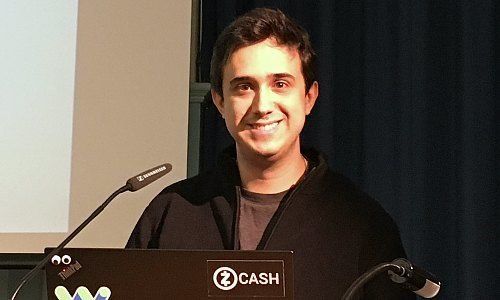A Silicon Valley cryptocurrency provider raised a record $232 million in a coin offering last month. finews.com looks at a Swiss linchpin which is fueling a rich payout for the firm's co-founders.
Tezos is the brainchild of Arthur (pictured above) and Kathleen Breitman (pictured below), two U.S.-based «crytpo-anarchists».
Arthur is the French math and computer science whiz turned quant trader who wrote the code behind their digital currency, the Tezzie. Kathleen is a Cornell graduate and alum of hedge fund Bridgewater, consultancy Accenture, and blockchain consortium R3.
Arthur and Kathleen are about to become very, very rich thanks to a hastily-arranged maneuver in Switzerland's «cryptovalley» in Zug.
The Breitmans unusually brash method of cashing in on the crypto-craze has raised some eyebrows even in Switzerland, which has welcomed cryptocurrency providers in the lakeside town roughly 30 kilometers south of Zurich.
Record Coin Raise
The couple founded Dynamic Ledger Solutions, which owns the technology behind the Tezzie, which doesn't yet exist.
Nevertheless, an initial coin offering – or fundraising in order to finance further development – brought in $232 million last month, the largest ever in the brief history of cryptocurrencies.
Tezos may not hold that record for very long, «Forbes» noted, as interest in Blockchain and cryptocurrencies runs high among both financial providers and the general public.
Regulating Crypto-Glut
The glut of crypto offerings has also drawn sharp criticism: Ethereum network co-founder Charles Hoskinson said recently crypto-coin offerings represent a «ticking time bomb» because people are «blinded by fast and easy money». Last week, the U.S. Securities and Exchange Commission said it would begin regulating coin offerings and issued a warning of potential fraud schemes, and Singapore said it will follow suit.
The regulation won't influence the Tezos ICO, which concluded three weeks ago. The offering wasn't capped at a certain amount, which is only one of several unconventional features of the fundraising.
The most unusual feature? The Breitmans transferred DLS into a Zug, Switzerland-based foundation several weeks before the coin offering launched. The Tezos foundation would oversee the fundraising, receive and manage all allocations, and assign token allocations.
Swiss Roll
Who is behind the Tezos Foundation? Zug-based law firm MME, which has quickly carved a niche for itself among cryptocurrency providers, set it up. In digital currency circles, MME, said to have as many as 14 lawyers now working full-time on cryptocurrency projects, is the go-to law firm for cryptocurrency providers in Switzerland.
MME organized three foundation council overseers, one of whom is well-known in Switzerland: Johann Gevers is the father of Monetas, a digital currency he is trying to establish.
The other two are computer scientist and entrepreneur Diego Pons, and Guido Schmitz-Krummacher, a German lawyer and businessman who sits in numerous boards including that of Bprotocol Foundation, which is developing another token system and raised $147 million just one month before Tezos.
Overseer Passes...
With the Tezzie code in hand, the foundation oversaw the record-breaking fundraiser, which it claimed would be supervised by Switzerland's regulator for foundations. The problem? The Bern-based overseer hasn't actually begun regulating the Tezos Foundation or agreed to look at the deal – much less sign off on the million-dollar deal.
«The Foundation Supervisory Authority is currently conducting several evaluations in regards to the oversight (of the Tezos Foundation). In this context, the Supervisory Authority has asked the foundation to contact Finma,» the supervisor told finews.com.
Thomas Linder, a partner in MME's tax team, disputes this view, saying the law firm has assurances from the Swiss regulator for foundations that the transaction would be approved – as well as a document stating so. He declined to make the document available to finews.com, citing legal confidentiality.
...Over to Finma
Swiss financial regulator Finma, which regulates financial firms, said Tezos' foundation doesn't have a license – which it doesn't need as a non-profit.
«Whether companies require permission from Finma depends on the activities it conducts in Switzerland, and has to be evaluated on a case-by-case basis,» a spokesman told finews.com. The regulator said it never comments on current or pending evaluations.
Linder, the MME partner, said the Tezos foundation plans to contact Finma over the transaction, even though it is not legally required to do so.
$20 Million Payout
Why does regulating a not-for-profit foundation matter? Because Tezos plans to pay its shareholders a 8.5 percent cut of the two-week fundraising blitz.
Provided Tezos functions as a blockchain for at least three months, that makes for a nearly $20 million payout for the Breitmans, who will also receive 10 percent of the tokens.
Linder, the foundation's tax specialist, said the payday reflects the multi-year development of Tezzie technology, which he termed more advanced than other cryptocurrencies.
Lax Swiss Oversight
Switzerland is known as a haven for foundations, which number more than 13,000. Most of them are non-profit organizations. More recently, cryptocurrency players like Ethereum have also set up Swiss foundations.
Tezos is taking the crypto-foundation idea one step further, using lax oversight in Switzerland to take a huge cut of fundraising proceeds. The alpine nation is keen to distance itself from its past as a haven for dirty money. Is it setting itself up as a haven to make a quick buck?
Urs Bernegger, a veteran banker turned consultant, thinks so.
«It’s one thing to support the ideas behind cryptocurrency, which is commendable. It’s another to exploit regulatory loopholes for quick gains without creating jobs for domestic talent or importing knowledge into Switzerland.»
Rigid Foundation Law
To be sure, there is nothing illegal in the fundraising methods, the use of a Swiss foundation (which is legally allowed to generate and distribute profits), or the method or amount of payout in fiat and cash. DLS and Tezos have publicly disclosed their plans to potential investors.
MME's Linder said Tezos had chosen a Swiss foundation in part because Switzerland's liberal stance on cryptocurrency projects but also because of the inflexibility of Swiss structures, which once set up are nearly impossible to alter.



































